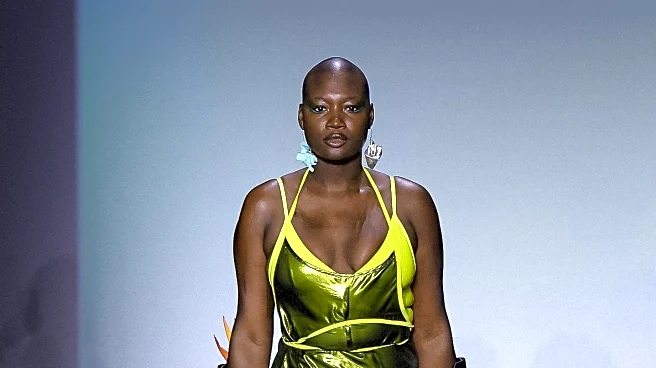What's Happening?
The Black in Fashion Council (BIFC) concluded New York Fashion Week with an intimate dinner party in Bushwick, organized by co-founders Lindsay Peoples and Sandrine Charles. The event aimed to reconnect with board members, new partners, and supporters following the season's showroom. The dinner featured a menu of grilled salmon, steak au poivre, cacio e pepe gnocchi, and French fries, with Lalo tequila cocktails and floral arrangements by BUDS. Notable attendees included Denée Benton, Gunna, Jordyn Woods, Kamie Crawford, Sergio Hudson, Zerina Akers, Gabriella Karefa-Johnson, and 2024 CFDA/Vogue Fashion Fund winners Dynasty and Soull Ogun of L’Enchanteur. The evening also included a surprise birthday toast for Emil Wilbekin, a journalist and former Vibe editor-in-chief, recognized for his contributions to championing Black creatives.
Why It's Important?
The event underscores the ongoing influence and leadership of Black creatives in the fashion industry. By hosting such gatherings, the Black in Fashion Council fosters a sense of community and collaboration among industry leaders and emerging talents. This initiative not only celebrates the achievements of Black creatives but also highlights their pivotal role in shaping the future of fashion. The presence of high-profile attendees and industry leaders at the dinner signifies the importance of diversity and inclusion in fashion, promoting a more equitable and representative industry landscape.
What's Next?
The Black in Fashion Council plans to continue hosting micro dinners and events throughout the season, engaging with various groups and collaborators within their network. These gatherings aim to strengthen relationships and support the ongoing development of Black creatives in the fashion industry. As the council continues its efforts, it is likely to inspire similar initiatives across other sectors, further promoting diversity and inclusion.
Beyond the Headlines
The dinner highlights the cultural significance of fashion as a platform for social change and representation. By celebrating Black creatives, the event challenges traditional industry norms and encourages a broader acceptance of diverse voices and perspectives. This shift could lead to more inclusive practices and policies within the fashion industry, ultimately influencing other creative sectors.









